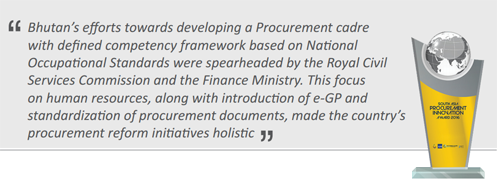Feature Stories
- How Bangladesh bridged the gap between amateur and professional in government procurement
- Rated Criteria: Promoting Value in World Bank Procurement
- Public Procurement Transformation in Bangladesh
- Achievement of Value for Money and Enhancement of Efficiency, Economy and Transparency in Procurement - Document Archive System
Archives
- End-to-End Procurement Planning and Maintenance System Integrated with Project MIS
- Application of Construction Milestones in Rural Road Contracts of Nepal
- Gross National Happiness Model for Pursuing Sustainable Public Procurement
- Government procurement is the basis of wide opportunities for enterprise development
- The Challenges of Procurement Training in a Fragile Country: the Afghanistan Experience
- When and How to Open Contracts: Transparency and Engagement through World Bank Projects
- Innovations and Best Practices in Procurement Processes of Disaster Recovery Projects
- World Bank Experts Discuss Global Procurement Trends and Armenia's e-GP system with the National Assembly
- Technology driving transparent and accountable public procurement reform in Bangladesh
- Prototype for Implementation of Framework Agreement via Blockchain
- Construction Project Planning and Management Capacity Building in India: A Wholistic Approach to Boost Infrastructure Development
- Zimbabwe: Public Procurement reform to catalyze greater transparency and development
- 15th Procurement, Integrity, Management and Openness (PRIMO) Forum
- e-Procurement World Map
- Preventing and controlling corruption: A modern approach to Procurement
- 6th South Asia Public Procurement Conference held in Thimphu, Bhutan
- South Asia Procurement Innovation Awards 2018 Announced
- Procurement iNET completes 5 years and new CPPP Fastest 100% Challenge Launched
- Risky Business: Does Debarring Poor Performers Mitigate Future Performance Risk?
- Global Procurement Summit 2019, New Delhi, India
- World Bank India launches Survey for International Civil Works Contractors
- World Bank launches new Complaints Module in Systematic Tracking of Exchanges in Procurement (STEP) System
- New Open Contracting Data Standard for e-Procurement Systems Launched
- Bangladesh's success in public procurement: Sustained reform really pays off
- The five drivers for improving public sector performance: Lessons from the new World Bank Global Report
- South Asia Public Procurement Innovation Awards 2018
- Conversation with Khaled Elarbi, President, High Authority for Public Procurement (HAICOP), Tunisia on the Digitalization of Public Procurement
- Breaking the glass ceiling in Africa: Rwanda E-Government Procurement System
- How government e-marketplace is revolutionizing procurement in India
- Ensuring Value for Money in Infrastructure Projects - The Botswana way
- Blockchain Lessons for Procurement
- Botswana’s Benevolent Move to Enhance its Procurement Profession
- Achieving Better Value for Money Using e-Auction for Procurement of Goods by Public Sector - A Success Case from DPDC
- Guide to Project Management and Contract Management (GPMCM) – New Approach to Improve Efficiency and Effectiveness of Procurement Outcomes
- Regional Winners of SAPIA 2017 participate in 8th International Public Procurement Conference (IPPC 8) Arusha, Tanzania
- The Future of Public Procurement in the Era of Digitalization
- World Bank Operations Procurement Helping Turkey to Procure a US$2 Billion Gas Storage Facility
- Unlocking Energy Efficiency Market in India - Through Innovative Procurement Business Model
- Getting value for money: Creating an automated market place for farmers in Pakistan
- Towards a Single Market for Public Procurement in Caribbean Small States
- Web-Based Online Evaluation Tool (e-Tool) for Procurement of Works by Royal Government of Bhutan
- Strengthening Health Sector Procurement System Offer Hopes for Universal Health Coverage in Nepal
- Morocco makes Strides in Modernizing its Public Procurement System— Operationalization of the Procurement Regulatory Body
- Innovations in Procurement Process and Selection that Lead to Improved Outcomes – Tenderers’ Database Management System
- Looking Back and Forward: The World Bank’s Procurement Framework
- Independent Monitoring and Evaluation of Contracted Health Services Leads to Improved Outcomes in Rural Areas of Afghanistan
- Fifth South Asia Region Public Procurement Conference brings focus on Procurement in Public Service Delivery
- 12 Procurement Innovations from South Asian Countries Celebrated
- Social Media is Improving Procurement in Lao PDR
- ASEAN meeting explores ways of professionalizing public procurement to meet development challenges
- Second International Training Program on the World Bank’s New Procurement Framework
- South Asia Procurement Innovations Award 2017 launched with Bigger and Better Prizes
- How to bid, finding opportunities, what makes a successful bid
- Pushing boundaries in procurement framework implementation
- Experience of Developing PPSD for the Assam Agribusiness and Rural Transformation Project (APART), India
- An Electronic Approach: Streamlining Georgia's Procurement
- South Asia Heads of Procurement Knowledge Exchange Program to U.S. Government Procurement Systems started
- 13th Procurement, Integrity, Management and Openness (PRIMO) Forum - a Documentary
- Bangladesh to strengthen public procurement with World Bank supported Project
- Establishment of Technology-Based Health Procurement and Supply Chain Management System, and Capacity Development in Tamil Nadu Medical Services Corporation
- Towards a Single Market for Public Procurement in Caribbean Small States
- Redefining Procurement as an Innovative and Collaborative Centre of Excellence for Best-in-Class Sourcing Solution
- India’s PowerGrid Endorsed for Alternative Procurement Arrangements by the World Bank
- Achieving Value for Money in Indonesia’s Geothermal Project
- Citizen Monitoring of Rural Roads Under Pradhan Mantri Gram Sadak Yojana (PMGSY), India
- Establishment of Grant and Service Contract Management Unit (GCMU) to Manage Contracting Out of Health Services in Afghanistan
- Procurement for Regional Development–Public Policy Initiative in Sri Lanka
- PPAF Community-Driven Development (CDD) Procurement Model, Pakistan
- Making Successful Procurement of IT Systems - An Experience from Vietnam
- Procurement Observatories continue to deliver in India
- Implementation of National e-GP System in Nepal
- Government e-Marketplace (GeM), India
- Africa High Level Public Procurement and Electronic Government Procurement Forums
- Development of Procurement Cadre as Part of Holistic Procurement Reforms in Bhutan
- Modernizing Public Procurement in Zimbabwe, one Step at a Time
- Citizen Engagement During Public Procurement Implementation in Bangladesh
- Winter 2017 Virtual Procurement, Integrity, Management, and Openness (PRIMO) Forum on Sanctions and Debarment Systems
- Close and Personalized Procurement Monitoring, Leading to Procurement Efficiency in Irrigation Sector in Fragile and Challenging Environments of Afghanistan
- Procurement Framework 2016 offers wider choices to ‘Go to Market’ based on PPSD
- Procurement Framework 2016 - Benefits, Status of Roll-out and M&E Arrangements
- PPSD offers Fit for Purpose Procurement Solutions
- Global Procurement Summit
- Fourth South Asia Region Public Procurement Conference
- The World Bank e-Procurement Tools
- South Asia Procurement Innovations Awards, 2016
- Learning Videos launched on STEP, online tracking tool on procurement for World Bank Projects
- Open e-Learning is Building a Cadre of Procurement Experts
- South Asia Region Public Procurement Conference, 2017
- Online Certificate Program in Public Procurement in Arabic Launched in Egypt
- First Procurement Knowledge Exchange Forum among ASEAN Countries
- Nobel Prize in Economics for contribution to Theory of Contract
- The Africa Region Harnesses Integrated e-Government Procurement (e-GP) Systems in Pursuit of Transparency and Integrity
- Procurement Reform for Humanitarian and Development Challenges in Kurdistan Region of Iraq (KRI)
- Successful Procurement is not just a set of Activities, it is a Strategy
- Afghanistan - Trends and Recent Developments in Governance
- PPSD is an Opportunity for clients and staff for Improved Procurement Management
- Procurement Reform Advances in the MENA Region
- Data Analysis and Collaborative Work in Action for Expedited Disbursements in Africa
- Ensuring Good Governance in Procurement in Sri Lanka
- New Procurement System to Improve Development Impact and Transparency in South Asia
- World Bank, USTDA Formalize Procurement Partnership
- How the New Procurement Framework Will Benefit 45.6 Million People in India
- Procuring the Future
- Reasons to Bid, Finding Business Opportunities
- New World Bank Procurement Framework Promotes Strengthened National Procurement Systems
- The readiness for Procurement Framework 2016
- 6 Things to know about New Procurement Framework
Development of Procurement Cadre as Part of Holistic Procurement Reforms in Bhutan


{This article is an abridged version of the submission on “Procurement Cadre in Bhutan” made by Ms. Jamyang Dema, Ministry of Finance, Thimphu, Bhutan, for the South Asia Procurement Innovation Awards.}
Summary
The Royal Government of Bhutan embarked on reforms in its National Procurement System very early (September 2005). The Royal Civil Service Commission has played an enormous role in taking these procurement reforms forward. The Government recognized the need to professionalize procurement within its civil service and also approved the creation of the Public Procurement Policy Division (PPPD) under the Ministry of Finance to allow the latter to take procurement reforms forward in an exponential way. Coupled with other initiatives, like e-procurement and standardization of bidding documents, these reforms in human resources for procurement have contributed significantly towards development of an efficient and effective procurement system in Bhutan.
Background
Landlocked between China and India, Bhutan is a small kingdom covering nearly 38,500 square kilometers in the eastern Himalayas. In the last couple of decades, the Kingdom of Bhutan has experienced rapid social and economic development, as a result of prudent macroeconomic management, beneficial exploitation of hydropower resources, and substantial support from development partners. As part of the reforms to ensure good governance, the Royal Government of Bhutan (RGoB) has undertaken various steps towards creating an efficient, effective, transparent, and fair national procurement system. The Public Procurement Policy Division (PPPD) was established within the Ministry of Finance in August 2008 to facilitate policy and professional development in the field of procurement. After establishment of the PPPD, the Royal Civil Service Commission felt the need to create a Cadre of Procurement staff and station procurement officers in different departments to carry out Government procurement efficiently. The Competency Framework for Procurement positions and job descriptions was approved by the Royal Civil Service Commission. The Procurement Cadre System has been so integrated that it ensures career development of civil servants in the country, which makes it a unique innovation from Bhutan. This experiment of stationing procurement officers in Ministries, Dzongkhags and Autonomous agencies, coupled with other initiatives like e-procurement and standardization of bidding documents, has led to major improvements in efficiency of procurement and public expenditure management in RGoB.

The challenges addressed by introduction and establishment of procurement cadre are as follows: 1) Introduction of the Procurement Cadre System to establish a clear line of reporting, where Procurement personnel report directly to the Public Procurement Policy Division (PPPD). 2) Capacity development issues were addressed by imparting awareness and training on public procurement. 3) Professionalization of procurement personnel under Government agencies was taken up as one of the topmost priorities after implementation of Cadre System. 4) Performance of procurement personnel was improved. 5) Under-utilization of procurement expertise issues were addressed through clear lines of responsibilities within the job description and Competency Framework.

Procurement cadre is one of the tools used by RGoB to professionalize Procurement personnel and improve the efficiency, effectiveness, and efficacy of the Procurement process. The Cadre System has enhanced the competence of national procurement, and strengthened the Procurement Competency Framework. It will enable individuals to identify gaps in their current competencies related to their current roles, and assist in training needs analysis and development of future personnel development plans. A consistent point of reference and benchmark for procurement performance can be set with implementation of the Cadre System. The Procurement Competency Framework, based on National Occupational Standards in Procurement Management and collective analysis of other Government procurement frameworks internationally, provides an opportunity for procurement to be consistent across all departments at each of the levels in the Himalayan Kingdom. This will enable RGoB to be more confident in its capability internationally

Impact Generated
The Cadre System, introduced and implemented by the Royal Government of Bhutan, has brought in many positive impacts. They are:
- Introduction of training course - Certificate in Procurement Compliance (CPC) for all personnel involved in procurement, including tender committee members at all levels of the Government.
- Incorporation of a Module on Public Procurement in Post Graduate Diploma in Financial Management (PGDFM) Course at the Royal Institute of Management.
- The Competency Framework enables RGoB to align procurement roles with its objectives and overall business requirements. It can be used to design different roles for different levels of seniority. The identification of key core business skills versus procurement skills can be balanced against the requirements of different Government departments and contextualized to individuals who operate in these departments.
- The aim is that in the future, the Competency Framework will align the skills for the job role, and not the job holder, which will assist in recruitment and career progression.
Job description for Procurement Personnel, revised to include core responsibilities, included:
- Timely procurement and supply of goods, works, and services essential for smooth running of the Government organization.
- Consolidation and restructuring of the procurement Human Resource cadre, with creation of an additional level, making it more amenable to efficient and effective delivery of procurement and supply services.
- Provision is also being made for supporting staff to assist officers of the cadre.

Scalability and Sustainability
The Procurement Cadre System can be replicated in other countries across the world, weighing the benefits that the Cadre System brings in the Government Organization, from the impact it makes, and the lessons learned from such a system. Organizations in other countries can set Bhutan’s Cadre System as an example and pilot it in their organizations and, if proven successful, they can adopt the Bhutan’s Procurement Cadre System itself. The Competency Framework and job description of Procurement personnel are designed in a very systematic and motivational way, which facilitates its replication anywhere in the world.

With implementation of the Procurement Cadre System, the Royal Government of Bhutan has learned lessons, including:
- A detailed research on the existing system will have to be carried out before introducing a new system.
- Acquire necessary approvals and recommendations from the relevant agencies for support during implementation.
- Incorporate feedback, comments, and suggestions from the relevant stakeholders to keep them informed.
- Carry out consultative workshops with the stakeholders concerned to incorporate their needs and opinions on the cadre system.
- There is a need to incorporate international best practices from other countries that have implemented such a system.
- Harmonization of existing Government policies and practices within the Cadre System.
- Attainment of transparency, competitiveness, cost effectiveness, and professionalism in the Public Sector Procurement System.

